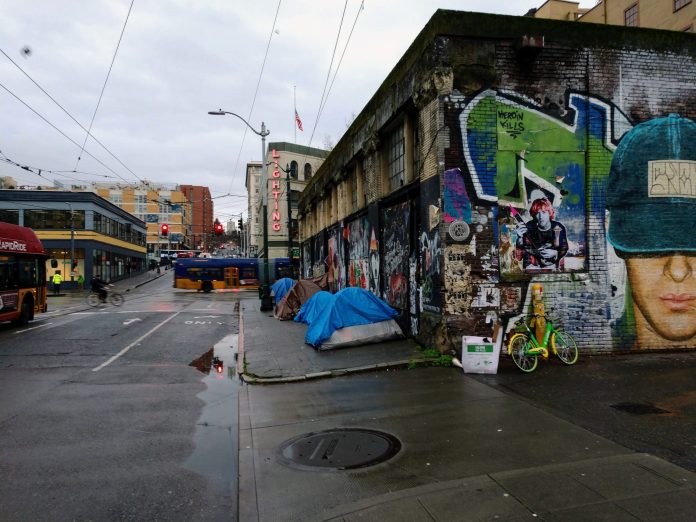Former Seattle City Councilmember Tim Burgess is back with a charter amendment setting a host of new mandates around homelessness, none of them funded by the measure. Asked how he responds to criticism this is an unfunded mandate, Burgess has pointed to a payroll tax he vigorously opposed as his pay-for.
“Perhaps the most obvious criticism to be leveled at the proposed charter amendment is that it’s an ‘unfunded mandate.'” Kevin Schofield wrote in SCC Insight. “It requires up to $15 million for additional behavioral health services, as well as an unspecified amount for the 2,000 additional housing/shelter units. Burgess shrugged that off, arguing that particularly with the recently-passed payroll tax and the anticipated $239 million windfall from the recently-passed American Rescue Plan Act he believed that the city had sufficient funds to pay for it.”
Burgess’ opposition to business taxes goes back decades. He led the charge to repeal Seattle first head tax in 2007, and was one of the most outspoken opponents of the 2018 head tax, ensuring that tax was repealed before it could raise money for homelessness services. Co-writing in an op-ed in The Seattle Times with former Mayor Charles Royer, Burgess called the head tax a “terrible idea” and concluded: “As it stands, the proposed tax on jobs is ill-advised, extreme, and will result in job losses and harm workers.” While Burgess had a temporary victory on the head tax, the Seattle City Council came back in June 2020 and passed a larger payroll tax as part of the JumpStart Seattle plan spearheaded by Councilmember Teresa Mosqueda.
Moreover, Burgess has showed a penchant to criminalize homelessness, as his infamous 2010 anti-panhandling bill showed, which only avoided becoming law due to a veto by Mayor Mike McGinn. In his 2018 op-ed, Burgess again traded in language that dehumanized people experiencing homelessness, branded them with trash, and seemed to invite aggressive encampment removals, crafting his pitch to suburbanites and tourists rather than Seattleites.
“Finally, the people of Seattle are growing increasingly frustrated with city government’s inability to control the trash, dirty needles, illegal encampments, crime and disorder associated with some of the individuals living outside across our city. We share their frustration,” Burgess and Royer wrote. “Before raising taxes, city leaders should demonstrate their ability and willingness to enforce basic norms of behavior so all of the people of our city, including those who commute into the city for their work and tourists, can experience a clean and safe city environment.”
The other idea in Burgess’ advocacy against the head tax and payroll tax was that solution lied in establishing a King County’s regional homelessness authority that would avoid service “duplication,” mobilize the entire county, and someone better focus on results-driven proven solutions. Burgess’ endorsed successor, Mayor Jenny Durkan, signed legislation authorized a regional homelessness authority in 2019, but that authority has been slow in getting up and running and hasn’t delivered results yet. (Durkan also promised 1,000 tiny homes in first year, but delivered only 73.) The primary long-term obstacle remains: many suburbs continue to be obstinately opposed to evidence-based solutions (i.e., Housing First), particularly in so far as it involves siting no-barrier shelters and permanent supportive housing in their midsts.
The coalition behind Burgess’ charter amendment is surprisingly broad, including the SoDo BIA, the Chief Seattle Club, the Public Defender Association, United Way King County, the Housing Development Consortium, Plymouth Housing, FareStart, DESC, Evergreen Treatment Services, and the Downtown Seattle Association. Backers say this isn’t a bill aimed at forcing a campaign of homeless sweeps. However, Burgess’ track record hardly lends confidence to this claim. Likewise, the fact supportive housing targets set are well below than the estimated number of unsheltered people experiencing homelessness in the city suggest sweeps would need to continue to keep parks clear. The last tally was 3,728 in the January 2020 countywide count before the pandemic forced congregate shelter to be de-intensified to reduce virus transmission risk.
That said, the charter amendment includes promising ideas too, not just mandates to keep parks and public open spaces clear of encampments. One measure would speed up permitting and waive fees for supportive housing.
“During a civil emergency related to homelessness, such as the one that has been effect in Seattle for several years, it commits the city to expediting the production of emergency and permanent housing serving homeless individuals through several de-regulatory steps, including: waiving land use code and regulations to site projects faster; waiving permitting fees; pushing permit applications to the front of the line; and refunding to the projects all City-imposed costs, fees and City-collected sales taxes on all project expenditures,” Schofield explained.
“The charter amendment petition will be available for signature in April,” Burgess’ organization dubbed Compassion Seattle stated in a release. “Signatures will be gathered through early June. It is the goal to have the measure placed on the November 2021 ballot for city voters. To qualify for the ballot, the signatures of at least 33,060 registered Seattle voters must be collected.”
The Compassion Seattle campaign said that their polling showed strong support for their approach, thought it’s not clear what language was used in the poll and how closely it was linked to actual amendment language. Nevertheless, the 71% figure they quoted would suggest the charter amendment would be likely to pass as it stands now.
Doug Trumm is publisher of The Urbanist. An Urbanist writer since 2015, he dreams of pedestrian streets, bus lanes, and a mass-timber building spree to end our housing crisis. He graduated from the Evans School of Public Policy and Governance at the University of Washington in 2019. He lives in Seattle's Fremont neighborhood and loves to explore the city by foot and by bike.


